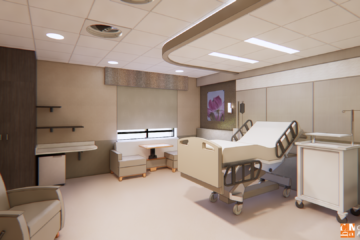I’ve gotten a massage each month since the beginning of 2023. That’s when I signed up for a membership at a local spa to help me with relaxation – something I’m absolutely terrible at. At my last appointment, before getting started, the massage therapist asked me to take a deep breath in.
As the air flowed out of my nostrils, she asked, “Do you breathe through your chest?”
“Yes – I think so,” I said, a bit confused. Doesn’t everyone breathe through their chest … where their lungs are? I thought.
When you get a full breath, she told me, it should almost feel like it’s filling your stomach. Many times when we’re anxious, she continued, we’re taking very shallow breaths. Apparently she only needed me to take one breath to notice it was as shallow as a kiddie pool.
Was it that obvious? I thought. I felt like I must’ve walked in there with an “I’m very anxious today” sign on my forehead.
By the time the hour massage was done, I could tell my heart rate had slowed. I could move my neck side to side and not feel my shoulders scrunched up with tension. I could take a breath and feel it in my stomach.
With May being Mental Health Awareness Month, I’ve been thinking a lot about the activities that make me feel recharged. I am an achiever, and if there’s something I can be doing, whether it’s for work, volunteering or loved ones, I’ll find a way to get as many things done as possible for as many people as possible. Over the years, I’ve found that if I don’t prioritize my own needs, all that doing leaves me feeling incredibly anxious, overwhelmed and exhausted. But I’ve also learned that if I don’t force myself to relax, I simply won’t. So for me, relaxation is a routine.
I enjoy starting each day with a workout, usually weight lifting. I get a massage once a month. I go to church with my husband every Sunday if we aren’t out of town. Lately, I’ve taken to playing a game of Solitaire before I go to bed.
Notably, there’s a common theme in all these activities: I’m not on my phone. At the spa where I get my massages, you aren’t allowed to bring your phone past the locker room. It’s rejuvenating to have a few moments to myself. Yet, at the same time, I’ve noticed that as I sit in the waiting area to be called for my massage, it feels, well, weird. And I can’t read minds, but it seems like it’s also uncomfortable for the other guests waiting for their treatments.
Our culture has become so wrapped up in staying connected that it now feels unnatural to sit in silence without email, social media or text messages to keep us busy.
This is not just my observation. There’s actually a term to describe this fear of being disconnected from your phone: nomophobia.
Numerous studies have found that excessive use of technology leads to more stress for people of all ages and backgrounds. Dr. Lisa Strohman, a psychologist and the founder of Digital Citizen Academy, said she’s seen a major increase in patients experiencing mental health challenges that directly relate to technology use, according to verywellmind.com.
This affects people of all gender identities, but researchers found that anxiety increased significantly for young people and women during the pandemic. Socioeconomic standing plays a major role – it’s hard to relax if you don’t know whether you can afford your next meal, if you don’t live in a neighborhood where it’s safe to go for a walk or if you work in a job that’s taxing on your body.
It seems I’m far from being alone in having a hard time relaxing, even though our minds and bodies need it. Ever the perfectionist, I’ve sometimes been hard on myself if I fell out of routine with self-care activities, even if only for a day, but this shame only made my anxiety worse. Instead of holding myself to unrealistic standards, a therapist once told me to ask myself each day if I did something to care for either my mind, my body or my soul. On an ideal day, we’d take care of all three, she’d explained, but we’re all busy, so this question helps make relaxation more attainable. It can be as simple as taking a few deep breaths, taking the stairs instead of the elevator to get more movement or lingering a little longer when looking at a piece of art you love. It doesn’t have to be perfect.
Ahead of writing this column, I took to LinkedIn to ask others what they do to recharge, a few people commented there and others emailed me. Alexson Calahan said she always has coffee (or an alternative) outside, no matter the weather. “It’s such a nice way to slowly wake up and consider the day,” she wrote. “I’ve never been one to pop up from bed and be ready to roll! When the day starts with to-dos and demands, I feel behind from the start.”
More than one person said that movement (be it yoga, going to the gym or taking a walk) helps clear their mind. Others talked about rituals that help them relax before bed. Someone told me they’ve taken up knitting, and I know many people who enjoy journaling, gardening and baking. It’s not surprising that the vast majority of these activities are cell phone free.
There is so much that technology provides us (including a means to publish Fearless stories and our newsletter, which we hope empowers you). But it’s also clearly a hindrance to our ability to relax if we don’t take time away from it. So, Fearless readers, take this as your sign to unplug – even if it’s only an hour at a time – and do something you enjoy.
Categories: Health Care

